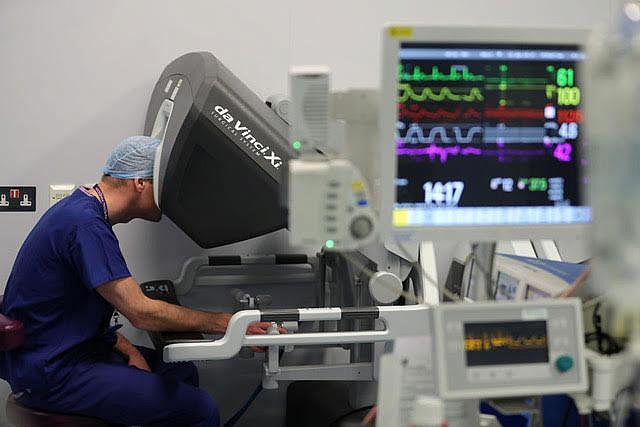Author’s indictment of our health care system is also a call for ‘slow’ approach to care

Is modern, tech-driven ‘fast’ medicine missing the bigger picture? (Photo: Daniel Leal-Olivas-WPA Pool/Getty Images)
In 2013, The New York Times aptly described Victoria Sweet’s first book, “God’s Hotel,” as a “transcendent testament to health care past.” We agreed, and have been waiting for her to tell us more about her vision of “Slow Medicine,” first described in her 2013 work. Sweet’s new book, “Slow Medicine: The Way to Healing,” picks up where the last one left off, offering more food for thought about where the practice of medicine has gone wrong.
Sweet is a magnificent writer, creatively weaving personal stories and patient encounters into a coherent indictment of our modern health care system. Her latest book starts off with a captivating and unsettling story about caring for her father at the end of his life. Her father’s doctors, while well-intentioned, failed to deliver the care he needed. The rushed, bureaucratic, and hyper-digitized modern health care environment created obstacle after obstacle, obscuring the real problems and resulting in a tragic series of misdiagnoses and management errors. Sadly, Sweet’s experiences are not uncommon, though most families, lacking Sweet’s health care savvy may not recognize the blunders as readily.
One of our favorite parts of Sweet’s book was her lucid explanations of “fast” and “slow” medicine. According to Sweet, “Fast Medicine” involves swashbuckling medical interventions: the life-saving cardiac catheterization for a patient experiencing a heart attack, the urgent endoscopy stopping a variceal bleed, or even the timely carotid massage to break an arrhythmia. Throughout the book, Sweet acknowledges and even praises the life-saving potential of “Fast Medicine.” But as Sweet matures in her career, she learns how “Fast Medicine” can also go wrong. She observes complications from overtreatment. She recognizes how aggressive approaches to illness may not meet patients’ goals. She observes how an overemphasis on “Fast Medicine” may crowd out simpler and more effective approaches to illness. And perhaps most of all, she gains insights into how the corporatization of health care culture drives these problems. Sweet observes that as doctors we “need to know what ‘Fast Medicine’ can do, what it can’t do, and what it shouldn’t do.”
As Sweet begins to appreciate the potential perils of “Fast Medicine,” she becomes interested in an alternative, more “thoughtful and deliberate” approach she refers to as “Slow Medicine.” She first sees this alternative approach in her mentors, who demonstrate how doing less may sometimes be better. She learns that it is often best to “do the most important things first and let the other [things] go.” Then, she learns about the “Slow Food” movement — an initiative emphasizing traditional cooking that began in Italy in 1986 in response to the expansion of the fast food industry — and appreciates its focus on “process.” Sweet is also inspired by the writings of Hildegard of Bingen, a German philosopher from the Middle Ages who emphasized a spiritual and naturalistic approach to health. Over time, Sweet increasingly incorporates “Slow Medicine” into her clinical practice, and observes firsthand how such an approach can benefit her patients. Eventually, however, she becomes frustrated by the corporate restraints that interfere with her ability to care for patients in the way she feels is best. In the end, she retires from clinical practice.
The Slow Medicine philosophy we promote in our writings has a somewhat different emphasis than that described by Sweet. We believe that it is possible to practice Slow Medicine, even in the current health care environment, by carefully abiding by the principles of evidence-based practice, parsimony, and common sense. Sweet embraces this evidence-based practice in both “God’s Hotel” and “Slow Medicine,” but ultimately concludes that it has become too hard to practice this way. While we agree that it is exceedingly challenging to practice “slowly” in the current harried health care environment, we believe there are pragmatic strategies for doing so. We emphasize avoiding unnecessary care — a potential time-saver — and advocate for our patients who prefer a slower approach. We sometimes highlight the need for policy changes, but as we await such fixes, we keep the focus on practicing “Slow Medicine” within our current health care constraints.
In a medical world increasingly preoccupied with speed and efficiency, Sweet’s book reminds us why we need to take the time to deliver more thoughtful, effective care. We think that’s a daily battle worth fighting.



